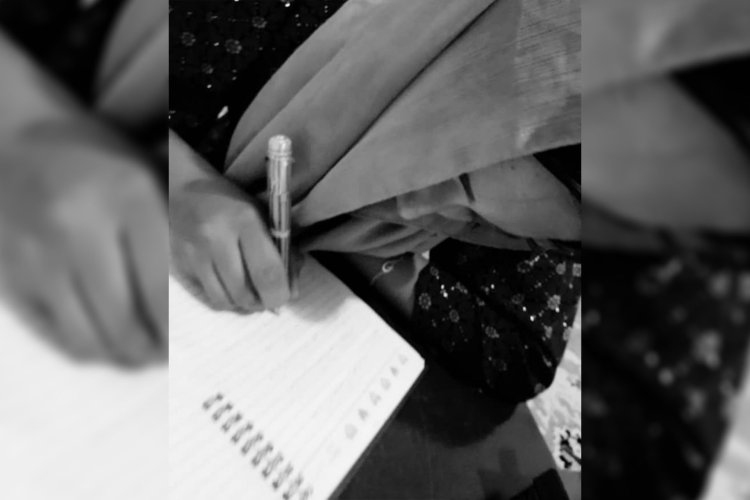Between Silence and Oppression

I was a child, a nineteen-year-old child. Warm-hearted yet withdrawn. Whenever someone said something that shook my heart, I remained silent and cried behind the fence of my quietude. When my father became angry, my tears poured like a spring rain.
Once, I had hidden The Blind Owl¹ under the faded carpet in my room—he had seen it. I don’t know how, or by whose account, but it was enough for him to know and see. He did not want me to read such books. Religious school, religious texts and commentaries², and a shelf full of explanations of Islamic law—these were what I was supposed to study. I had to attend school and hide myself under a chador. I had to think about marriage and childbirth. As a Muslim woman, I was expected to sweep the floors of the house and guard my father’s door, and later my husband’s house.
But I did not want that. School was a place of torment for me. I could not understand the explanations my father insisted I read. I had built another world, a world different from my father’s and his beliefs. Books bearing the name Hedayat³ on the cover, with a picture of Abbas Maroufi⁴ on the back, like The Symphony of the Dead⁵, cold and realistic, or like The Blind Owl, melancholic yet nourishing—I was fascinated and attached to such books, and I still am.
When my father flipped through The Blind Owl¹, he raised his voice. “What is this you are reading?” he asked.
I said, “It’s nothing bad, Dad.”
He said, “Are you playing with words with me?”
I dared again: “It’s nothing bad; I like to read it.”
His voice turned the silence of my room into smoke and destruction. When he took my book to the mosque to show the cleric, I lost myself. How could words take root so far? Was it truly something bad? No. Were my father’s books flawed? No. His beliefs were flawed. His convictions were old.
When I could not bring the book home again, a mobile phone became the only hope for the survival of my dreams. At that time, I borrowed an old phone from my brother. I read the remaining parts of The Blind Owl¹ on the small screen, hoping my father would not find out. No one must know! A year passed, and I read eight novels without my father knowing.
When I first read The Symphony of the Dead⁵, I cried—for myself mostly. Seeing how present I was in it. I saw myself as “Aydin.” In The Blind Owl¹, I could deeply feel my despair and exhaustion. It was a sensation telling me that I did not belong to this world or its system. My place was not in the world of contemporary people.
After finishing each book, I became more broken, calmer, and heavier-hearted, to the point where I felt separated from the company of people. I did not stand against my father, but I did not submit either. Perhaps it can be said that I remained suspended between silence and scream, yet I continued, quietly.
—Nikbin
---
Footnotes:
¹ The Blind Owl (Boof-e Koor) by Sadegh Hedayat
² Refers to Islamic textbooks and commentaries on religious law
³ Sadegh Hedayat, Iranian author
⁴ Abbas Maroufi, Iranian novelist and journalist
⁵ The Symphony of the Dead (Samfoni-ye Mordegan) by Abbas Maroufi
